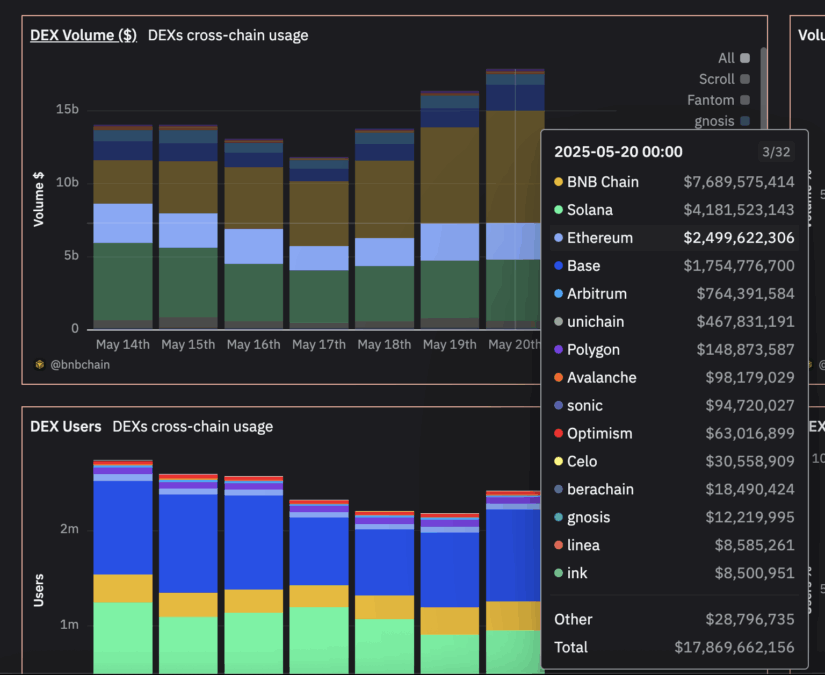BNB Chain Maxwell Hardfork Unleashes Lightning-Fast 0.75s Block Times—Ethereum Who?
BNB Chain just dropped a speed bomb with its Maxwell Hardfork—slicing block times to a blistering 0.75 seconds. Traders, meet your new high-frequency playground.
Why it matters: In a world where crypto moves at the speed of hype, BNB Chain’s upgrade isn’t just incremental—it’s a quantum leap. Forget waiting for confirmations; this is instant gratification for DeFi degens and arbitrage bots alike.
The cynical twist: Wall Street still can’t decide if crypto is ‘too volatile’ or ‘too slow.’ Meanwhile, BNB Chain just lapped traditional finance with sub-second finality. Enjoy your T+2 settlements, boomers.
 Source: Dune
Source: Dune
Developers had been expecting the change since May, when the release candidate landed on testnet and guilds began stress‑testing dApps under the tighter clock. That month of rehearsal proved essential. Smart contracts hard‑coded to 1.5‑second assumptions needed quick surgery; rate‑limit logic tied to older epochs required retuning.
The Maxwell Hardfork is going live on BSC mainnet.
This isn’t just another upgrade—it’s a technical leap forward for faster blocks, better validator coordination, and smoother network performance.
Here’s what’s changing 🧵👇 pic.twitter.com/TFWQR0DZ0j
Teams that cut corners in Lorentz suddenly found bugs surfacing under the faster tick. By launch day, most major DeFi platforms reported clean health checks, though smaller projects were still scrambling to patch edge cases.
Validators, meanwhile, faced a different challenge: raw throughput. A shorter block time doubles the number of consensus rounds an operator must process in the same minute.
To make that practical, the network now batches messages more efficiently, and hardware profiling during testnet suggested memory and CPU headroom remained comfortable.
Even so, node operators have been advised to monitor load over the coming weeks as real‑world traffic often diverges from lab conditions.
Maxwell also changes the game for MEV searchers. A sandwich bot that once had a second and a half to slot bids between swaps now works with barely half that window. Some arbitrage plays that relied on leisurely latency have already been abandoned, and builders specialising in ultra‑fast execution are eyeing fresh turf.
For ordinary users, that shift could mean fewer predatory trades slipping into the mempool, though history suggests opportunists will adapt quickly.
The path to today’s launch started in January when Lorentz’s hardfork carved block times from 3s to 1.5s. That earlier cut coincided with a visible drop in chain reorgs and a surge in daily decentralised‑exchange volume, convincing the Core team that even more headroom remained.
Maxwell pushes that thesis to its limit: sub‑second blocks without destabilising consensus. Internally, the upgrade doubles the epoch length to 1000 blocks and sets each validator’s turn at 16 blocks, about 12s, a tweak meant to preserve fairness while keeping finality under two seconds.
Market reaction has been muted. BNB, the chain’s native token, drifted sideways in the hours before and after the fork, suggesting traders had priced the MOVE in or were waiting to see real‑world performance data before betting on throughput translating to demand.
On social channels, sentiment was cautiously optimistic; developers praised the smooth cut‑over, while critics noted that speed alone won’t solve every scalability concern.
Even so, the broader picture is clear. In an industry where Solana, Sui, and a growing list of rollup projects tout millisecond confirmations, BNB Chain can no longer rely solely on low fees and a large user base.
Maxwell puts the network into the sub‑second club and gives its ecosystem new room to experiment with real‑time gaming, high‑frequency DeFi, and responsive Web3 social platforms, all without asking users to sacrifice familiarity.
For builders, the next few weeks will reveal how well the upgrade holds under peak demand. If block propagation stays smooth and reorg counts remain low, Maxwell will stand as proof that iterative, measured engineering can keep a mainstream chain competitive.
If cracks appear, the community may need yet another round of fine‑tuning. Either way, the era of three‑second blocks on BSC is now a footnote, and the race for ever‑faster finality moves on.
Also Read: ethereum Dev Proposes New EIP to Cut Block Timing 50% to 6 Seconds


